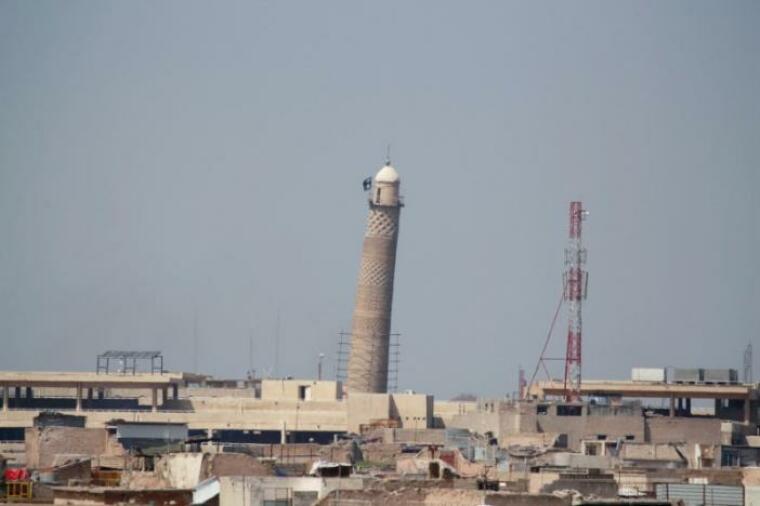ISIS destroys historic Mosul mosque where terror leader declared caliphate

The Islamic State has blown up the historic Grand al-Nuri Mosque of Mosul, where the terrorist group's leader, Abu Bakr al-Baghdadi, declared a caliphate in 2014.
The Grand al-Nuri Mosque was blown up by the militants on Wednesday night as Iraq's elite Counter Terrorism Service (CTS) units got within 50 meters of the historic structure.
The terror group's Amaq news agency alleged that an American aircraft had destroyed the mosque, but the U.S.-led coalition fighting the militants swiftly denied the accusation.
"This is a crime against the people of Mosul and all of Iraq, and is an example of why this brutal organization must be annihilated," said U.S. Army Major General Joseph Martin.
An Iraqi military spokesman noted that the explosion occurred at 9:35 p.m. (1835 GMT). Earlier on Wednesday, Iraqi forces said that they had started a push toward the mosque.
"This will not prevent us from removing them, no, killing them not removing them, inside the Old City," said Lieutenant General Abdul Ghani al-Assadi, senior CTS commander in Mosul.
Iraqi Prime Minister Haider al-Abadi said that the destruction of the mosque was the terror group's way of admitting that they are losing the fight.
"Blowing up the al-Hadba minaret and the al-Nuri mosque amounts to an official acknowledgement of defeat," the prime minister stated on his website, according to Reuters.
The leaning minaret, which is known as the Al-Hadba or "the hunchback," had stood in Mosul for more than 840 years. Residents in western Mosul are still reeling from the loss of the structure, which was destroyed during the celebration of Laylat al Qadr, which falls within the final 10 days of Ramadan. The event commemorates when Muslims believe the Quran was revealed to the Islamic prophet Muhammad.
Mohammed Tariq al-Bayati, who grew up next to the mosque, said that he felt like his childhood had also been demolished after learning of its destruction.
"I was in my grandfather house. I remember we used to play under its shade," he said. "It is the city's icon, I can say that Mosul has died," he added.
Nabeel Nouriddin, a historian and archaeologist specializing in Mosul and its Nineveh region, noted that the minaret was vulnerable to blasts even if it was not directly hit as it had not been renovated since 1970.
Baghdadi declared himself "caliph," or ruler of all Muslims, from the mosque's pulpit on July 4, 2014. His speech at the mosque was the first time he revealed himself to the world, and the footage of his proclamation is the only known recording of him as "caliph" to this day.
 Christians don't have to affirm transgenderism, but they can’t express that view at work: tribunal
Christians don't have to affirm transgenderism, but they can’t express that view at work: tribunal Archaeology discovery: Medieval Christian prayer beads found on Holy Island
Archaeology discovery: Medieval Christian prayer beads found on Holy Island Presbyterian Church in America votes to leave National Association of Evangelicals
Presbyterian Church in America votes to leave National Association of Evangelicals Over 50 killed in 'vile and satanic' attack at Nigerian church on Pentecost Sunday
Over 50 killed in 'vile and satanic' attack at Nigerian church on Pentecost Sunday Ukrainian Orthodox Church severs ties with Moscow over Patriarch Kirill's support for Putin's war
Ukrainian Orthodox Church severs ties with Moscow over Patriarch Kirill's support for Putin's war Islamic State kills 20 Nigerian Christians as revenge for US airstrike
Islamic State kills 20 Nigerian Christians as revenge for US airstrike Man who served 33 years in prison for murder leads inmates to Christ
Man who served 33 years in prison for murder leads inmates to Christ


 Nigerian student beaten to death, body burned over ‘blasphemous’ WhatsApp message
Nigerian student beaten to death, body burned over ‘blasphemous’ WhatsApp message 'A new low': World reacts after Hong Kong arrests 90-year-old Cardinal Joseph Zen
'A new low': World reacts after Hong Kong arrests 90-year-old Cardinal Joseph Zen Iran sentences Christian man to 10 years in prison for hosting house church worship gathering
Iran sentences Christian man to 10 years in prison for hosting house church worship gathering French Guyana: Pastor shot dead, church set on fire after meeting delegation of Evangelicals
French Guyana: Pastor shot dead, church set on fire after meeting delegation of Evangelicals ‘Talking Jesus’ report finds only 6% of UK adults identify as practicing Christians
‘Talking Jesus’ report finds only 6% of UK adults identify as practicing Christians Mission Eurasia ministry center blown up in Ukraine, hundreds of Bibles destroyed: 'God will provide'
Mission Eurasia ministry center blown up in Ukraine, hundreds of Bibles destroyed: 'God will provide' Church holds service for first time after ISIS desecrated it 8 years ago
Church holds service for first time after ISIS desecrated it 8 years ago Burger King apologizes for 'offensive campaign' using Jesus' words at the Last Supper
Burger King apologizes for 'offensive campaign' using Jesus' words at the Last Supper Uganda: Muslims abduct teacher, burn him inside mosque for praying in Christ’s name
Uganda: Muslims abduct teacher, burn him inside mosque for praying in Christ’s name